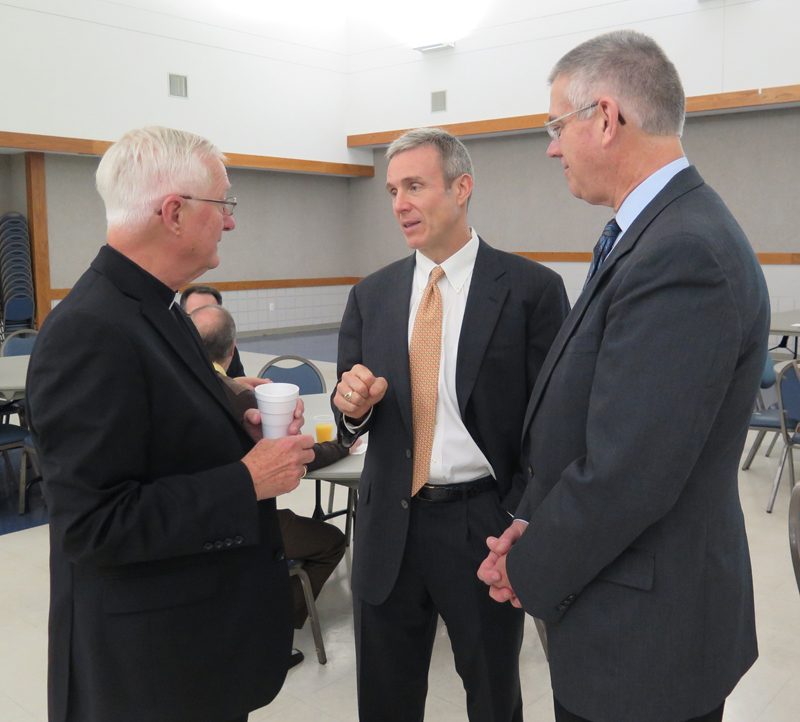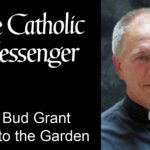By Anne Marie Amacher
The Catholic Messenger
DAVENPORT — Health care professionals and students gathered recently for a White Mass and a talk by Dr. Wes Ely of Vanderbilt University School of Medicine on end of life decisions. Bishop Martin Amos presided at the Oct. 1 Mass at St. Paul the Apostle Catholic Church. Fathers Tony Herold and William Kneemiller concelebrated. The St. Thomas Aquinas Guild of the Quad Cities organized the event.

Bishop Martin Amos listens to Dr. Wes Ely, center, and Dr. Timothy Millea prior to a talk on end of life discussions Oct. 1. The talk followed the White Mass for medical professionals at St. Paul the Apostle Parish, Davenport and was sponsored by the St. Thomas Aquinas Guild of the Quad Cities.
As Oct. 1 was the feast of St. Therese of Lisieux, Bishop Amos talked about her deep desire to become a religious sister from a young age. At first she was denied entry by a religious order, her bishop and even Pope Leo XIII. But at age 15 she finally received permission from her bishop to enter the Carmelites.
“Her life was filled with illness and anxiety,” Bishop Amos said in his homily. “She died nine years after entering religious life, at the age of 24.” She is one of only 33 people, and one of only three women, to be declared a doctor of the church. “Her writings were held in great esteem. There is much she can teach us,” the bishop said.
He talked about the Hippocratic Oath, an ethical code adopted by the medical profession. While it has changed over the years, the basic emphasis remains: to uphold ethical standards in treating the sick, respect privacy and prevent disease. Medical professionals are not to administer poison to anybody when asked to, and to not suggest it, the bishop said. He reminded medical professionals to not play God, but to continue to see life as sacred and belonging to God.
After Mass, Dr. Ely gave a talk on “Protecting Human Dignity at EOL (end of life) — a Faith Based Approach.” He noted that end of life discussions are difficult.
“The key is to plant a seed,” he said.
“About one in three of my medical ICU patients die in the hospital, the national average,” he said. “As a practicing intensivist (ICU physician) and a Catholic, my opinions are based on Scripture, the teachings of the church and my anecdotal experience in caring for thousands of dying patients of all faiths, beliefs and non-beliefs. I have no incentive to hasten death, and (the) incentive of heaven to preserve life and God’s will.”
Dr. Ely observed that a Catholic’s faith holds that person together. Prayer and direct actions will help each one to find meaning in her or his life. He encouraged medical professionals to ask their patients about their spiritual values, whether or not they claim a faith. “Do not be judgmental. Respect what they say.” He shared that he once asked a woman about her spiritual values. She responded that his faith was different from hers, even though he had not told her he was Catholic. “I don’t believe in God, and you do. But let me die in peace,” she told him.
The doctor sees a change in secular thinking, from “God is God and I am not” to “I am god and God is not.” He also spoke of natural law, which he said is “universal and based on the rational nature of humans (not religion). It applies to the entire human race. “Natural law is inscribed in the human heart, known by human reason, against killing and for preserving life.”
One of the most important words in theology is “and,” Dr. Ely said. Death is both evil and a good release. “This ‘both/and’ experience is true in that a death may lean one way or the other, but there is always something of both in every death. We are never completely sad about any death nor completely happy.”
Dr. Ely touched on Dr. Jack Kevorkian, the infamous “Dr. Death” who engaged in physician-assisted suicide. Dr. Ely identified a new “Dr. Death,” who has devised an “exit hood” to assist those who want to die using helium. In the process, they suffer from suffocation.
“Euthanasia is an intentional cause of death. This is a grave violation of the law of God,” Dr. Ely said.
If a person can recover from a disease or illness with treatment, that person should not forgo treatment. If there is little to no chance of getting better, a feeding tube can be withheld. Rejection of life-prolonging procedures is acceptable if there is little to no chance of getting better, he continued.
End of life issues should be dealt with kindly and lovingly, to let go naturally. But Dr. Ely admitted, “It’s not easy.” He spoke briefly about palliative care — working with a family to make sure their loved one is comfortable. “You need to find the balance (in relieving pain). We need to seek to give people a reason to live.”











